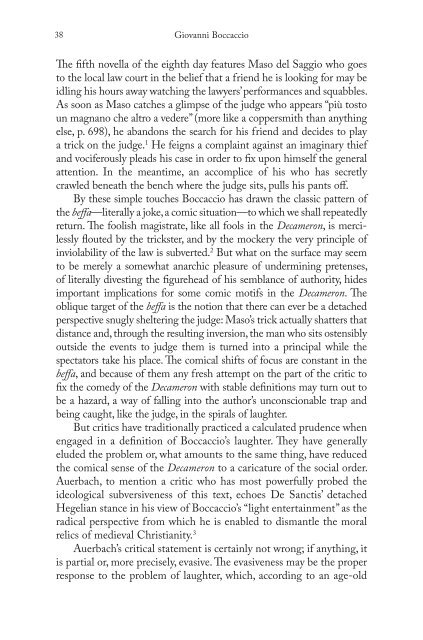Blooms Literary Themes - THE TRICKSTER.pdf - ymerleksi - home
Blooms Literary Themes - THE TRICKSTER.pdf - ymerleksi - home
Blooms Literary Themes - THE TRICKSTER.pdf - ymerleksi - home
You also want an ePaper? Increase the reach of your titles
YUMPU automatically turns print PDFs into web optimized ePapers that Google loves.
38<br />
Giovanni Boccaccio<br />
Th e fi fth novella of the eighth day features Maso del Saggio who goes<br />
to the local law court in the belief that a friend he is looking for may be<br />
idling his hours away watching the lawyers’ performances and squabbles.<br />
As soon as Maso catches a glimpse of the judge who appears “più tosto<br />
un magnano che altro a vedere” (more like a coppersmith than anything<br />
else, p. 698), he abandons the search for his friend and decides to play<br />
a trick on the judge. 1 He feigns a complaint against an imaginary thief<br />
and vociferously pleads his case in order to fi x upon himself the general<br />
attention. In the meantime, an accomplice of his who has secretly<br />
crawled beneath the bench where the judge sits, pulls his pants off .<br />
By these simple touches Boccaccio has drawn the classic pattern of<br />
the beff a—literally a joke, a comic situation—to which we shall repeatedly<br />
return. Th e foolish magistrate, like all fools in the Decameron, is mercilessly<br />
fl outed by the trickster, and by the mockery the very principle of<br />
inviolability of the law is subverted. 2 But what on the surface may seem<br />
to be merely a somewhat anarchic pleasure of undermining pretenses,<br />
of literally divesting the fi gurehead of his semblance of authority, hides<br />
important implications for some comic motifs in the Decameron. Th e<br />
oblique target of the beff a is the notion that there can ever be a detached<br />
perspective snugly sheltering the judge: Maso’s trick actually shatters that<br />
distance and, through the resulting inversion, the man who sits ostensibly<br />
outside the events to judge them is turned into a principal while the<br />
spectators take his place. Th e comical shifts of focus are constant in the<br />
beff a, and because of them any fresh attempt on the part of the critic to<br />
fi x the comedy of the Decameron with stable defi nitions may turn out to<br />
be a hazard, a way of falling into the author’s unconscionable trap and<br />
being caught, like the judge, in the spirals of laughter.<br />
But critics have traditionally practiced a calculated prudence when<br />
engaged in a defi nition of Boccaccio’s laughter. Th ey have generally<br />
eluded the problem or, what amounts to the same thing, have reduced<br />
the comical sense of the Decameron to a caricature of the social order.<br />
Auerbach, to mention a critic who has most powerfully probed the<br />
ideological subversiveness of this text, echoes De Sanctis’ detached<br />
Hegelian stance in his view of Boccaccio’s “light entertainment” as the<br />
radical perspective from which he is enabled to dismantle the moral<br />
relics of medieval Christianity. 3<br />
Auerbach’s critical statement is certainly not wrong; if anything, it<br />
is partial or, more precisely, evasive. Th e evasiveness may be the proper<br />
response to the problem of laughter, which, according to an age-old

















